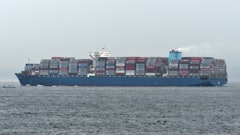Florham Park, N.J.—Feb. 6, 2015—In Albany, New York, SB 2648, legislation to eliminate the container freight charge (CFC) was approved by the Senate Corporations, Authorities and Commissions Committee February 2, 2015. The bill was referred to the Senate Finance Committee. This legistlation was also introduced in the New York State Assembly, A 2070. In 2014, New Jersey Governor Chris Christie signed S2747/A4170 into law to eliminate the Port of New York and New Jersey (PANYNJ) cargo facility fee. The CFC port fees will remain until New York’s legislative bodies vote, as New Jersey did last year, to eliminate these added costs.
The PANYNJ is the only port in the U.S. to impose a cargo facility charge on all containers, including empties. $4.95 is charged for 20-foot containers, $9.90 for 40-foot containers and $1.11 per unit for vehicle cargo. The PANYNJ is the most expensive port in the United States to process a container. These fees drive the cost of using the port even higher.
As reported by Kevin Lyons, Ph.D., Rutgers Business School, Center for Supply Chain Management and Marketing Sciences, most consumers throughout and at the end of the supply chain would never know anything about the CFC, but it could affect their bottom line. The New York metropolitan area has many manufacturers that strive to be globally competitive. The ability to export products is directly impacted by shipping costs; CFC is an added cost. In addition, employment and economic growth is affected by these added charges.
"This fee is costing ocean carriers $30 million a year, which exacerbates the extremely challenging financial environment ocean carriers have faced in recent years. Only three carriers have made a profit the last couple of years. We are optimistic that the New York State Senate and Assembly will recognize how critical removing these fees are to local businesses, the economy and the maritime industry as a whole," said Timothy Simpson, director of marketing and communications for North America, Maersk Line.


























